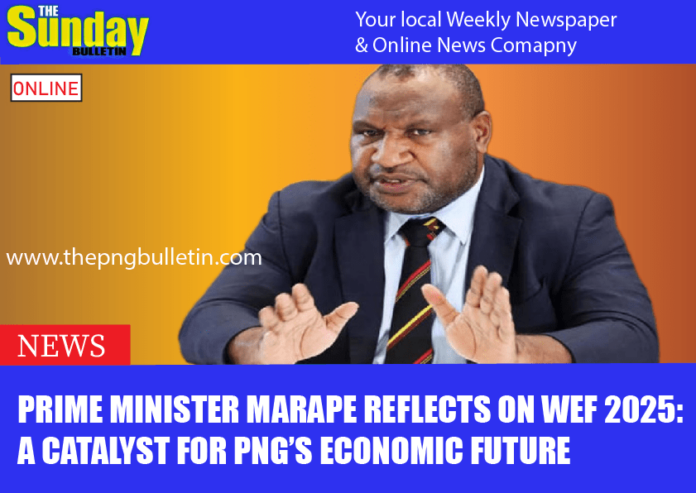PRIME Minister Hon. James Marape has described the World Economic Forum (WEF) in Davos, Switzerland, as an eye-opening experience and a significant opportunity to engage with global leaders in science, technology, business, and economic development.
Reflecting on the forum, Prime Minister Marape said, “WEF was not just about nation-to-nation discussions but also about connecting with global companies, technology innovators, and key investors. It provided a rare chance to meet the leaders of some of the world’s most influential organisations in one place—ExxonMobil, TotalEnergies, Newcrest Mining, and Newmont Corporation, to name a few—and discuss the future of Papua New Guinea as an investment destination.”
During the forum, the Prime Minister met with top executives, including the presidents and CEOs of ExxonMobil, TotalEnergies, and Newmont, as well as other influential players in the oil, gas, and mining sectors. These discussions reaffirmed their commitment to long-term investments in Papua New Guinea, including key projects such as Papua LNG, P’nyang LNG, and Wafi-Golpu.
“ExxonMobil and TotalEnergies shared plans to ramp up their investments in PNG, with Total committing $200–300 million to exploration activities this year in Central Province,” the Prime Minister stated.
“These companies have expressed strong confidence in PNG’s economic potential, underscoring their belief in the stability and growth of our nation.”
The Prime Minister highlighted that these investments represent over $20 billion in economic developments slated to take place in PNG over the next five years.
“This is a testament to the confidence global investors have in our economy and our resources, positioning PNG as a key player in the global energy and resource markets,” he said.
Prime Minister Marape emphasised PNG’s geographical and strategic importance in the Asia-Pacific region.
“With Asia driving the next century of global economic growth, PNG is uniquely positioned as a resource-rich nation close to major markets in Southeast Asia, China, and India. This proximity, coupled with our membership in ASEAN-related frameworks, makes PNG an attractive investment destination,” he said.
He added that the forum provided an opportunity to emphasise PNG’s transition towards becoming a hub for manufactured products and downstream processing.
“We want to go beyond just exporting resources. By establishing special economic zones and fostering partnerships with global investors, we aim to produce finished goods and export to Southeast Asia and beyond,” the Prime Minister said.
Prime Minister Marape also met agriculture and forestry companies at the WEF.
A key focus of the discussions at WEF was the government’s commitment to reforming Papua New Guinea’s investment framework ahead of its 50th anniversary of independence.
The Prime Minister outlined plans for a transition to a clear and investor-friendly hybrid production-sharing model.
“This new framework will ensure that PNG benefits equitably from its resources while giving investors clarity and certainty on their returns. Existing agreements will be honored, but new projects will operate under clear laws that define taxes, royalties, and equity arrangements. This approach will reduce negotiation timelines and provide confidence for both PNG and investors,” Prime Minister Marape said.
The reforms aim to create a legal structure that guarantees PNG’s long-term economic security, ensuring that future governments and investors operate with clarity and mutual benefit.
“This is about creating a legacy that transcends individual leaders—a structure that secures PNG’s future earnings while maintaining its attractiveness as a high-return investment destination,” he said.
The Prime Minister described the forum as a powerful reminder of PNG’s potential on the global stage.
“When the world’s largest oil, gas, and mining companies express confidence in PNG as an investment destination, it shows the strength of our nation’s position in the global economy,” he said.
“From our proximity to Asian markets to the vast resources we possess, PNG is poised to play a pivotal role in the global energy and resource sectors for decades to come. My government is committed to fostering partnerships with investors, creating opportunities for Papua New Guineans, and driving our nation’s development forward,” he concluded.

